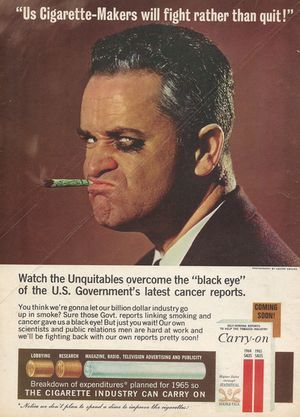Woodward and Feldstein

Watergate was a boon to journalism schools everywhere, prompting a generation of kids to want to be the next Bob Woodward or Carl Bernstein, or in some cases Bob Redford and Dustin Hoffman.
But MAD Magazine had already done the spadework on the burgeoning field of investigative journalists by getting them while still in knee pants, as it were, and encouraging them to question authority, particularly how the government and Madison Avenue were trying to sell them--everything from cigarettes (see picture) and booze to candidates and the Vietnam war.
MAD and TV grew up together. OK, TV grew up. Some of the wickedest parodies of TV shows could be found in its pages, and its savaging of cigarette ads was a public service and an important counterpoint to the pretty girls and hunky cowboys meant to entice a new generation of smokers.
Al Feldstein, editor of MAD during its rise from a comic book to an influential humor magazine, died last week. He was the editor when I began amassing my collection of the magazines, which I have to this day and guard jealously even though I mave most of them in a DVD collection that even lets me electronically fold the fold-in on the back page (perhaps the single most important advance of the digital age).
MAD has always reveled in subversion, including subverting the subversives. It was a cultural revolutionary force armed with seltzer bottles and wickedly accurate pens.
Having been brought up on the magazine, I did my own reveling when I was able to publish--on the B&C editorial page, no less--a retrans-related parody of Dr. Seuss' Hop on Pop entitled Fox on Cox. Then there was my send-up editorial of the Tennessee TV station account execs who sold advertisers into their newscasts with promises of puff stories. That one was "Pardon Me, Boss, I Sold the Chattanooga News Crew," to the tune of "Chattanooga Choo-Choo" (OK, I'm old, but it beats the alternative unless the alternative is young).
I digress.
MAD was a big influence on my view of the world. Feldstein, publisher William Gaines, abetted by Mort Drucker, Al Jaffee, Dave Berg, Jack Davis (who once drew a caricature of my father that remains a prized possession), Don Martin, Larry Siegel, Antonio Prohias and the “usual gang of idiots”--or as I like to call them, the original MAD Men, were all professors in the correspondence school of "don't buy everything adults are selling."
That advice proved just as valuable when the MAD kids grew up and started filling the ranks of print and broadcast journalism.
Multichannel Newsletter
The smarter way to stay on top of the multichannel video marketplace. Sign up below.
Contributing editor John Eggerton has been an editor and/or writer on media regulation, legislation and policy for over four decades, including covering the FCC, FTC, Congress, the major media trade associations, and the federal courts. In addition to Multichannel News and Broadcasting + Cable, his work has appeared in Radio World, TV Technology, TV Fax, This Week in Consumer Electronics, Variety and the Encyclopedia Britannica.

